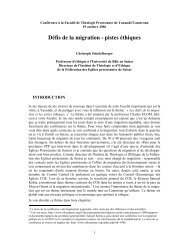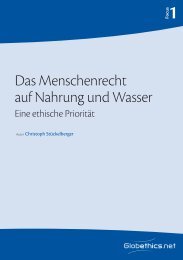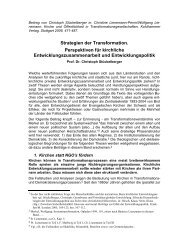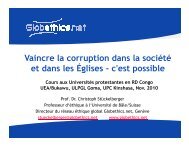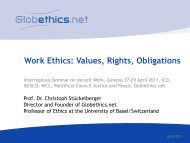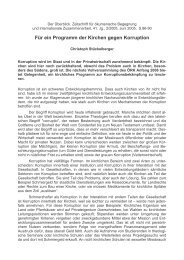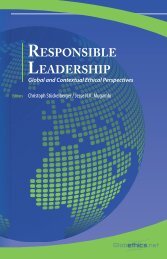BREAK THE CHAINS OF OPPRESION AND THE YOKE OF ...
BREAK THE CHAINS OF OPPRESION AND THE YOKE OF ...
BREAK THE CHAINS OF OPPRESION AND THE YOKE OF ...
You also want an ePaper? Increase the reach of your titles
YUMPU automatically turns print PDFs into web optimized ePapers that Google loves.
FuturE maintenance of apartheid but were guilty in benefiting from it and failing to<br />
challenge its injustice, so we did not originate the industrialized economies that<br />
resulted in climate change but are now guilty of enjoying the fruits of systems<br />
that threaten the future of God’s creatures. Drawing on Barth’s work, Conradie<br />
notes that our confession is only possible because of our knowledge of God’s<br />
grace: it is our encounter with God’s mercy that enables us to recognize our guilt.<br />
Conradie recognizes, however, that for most of us confession is still some way<br />
off, because we are not sure that we can envisage or want to live the renewed and<br />
reordered lives that would result from being forgiven. Like the rich man who<br />
could not bear Jesus’ command to be separated from his possessions and sadly<br />
turned away (Mk. 10.17–22), we look at the prospect of lives within levels of<br />
carbon emissions that the earth can sustain, and decide we prefer our lives of sin.<br />
Here, then, is the first challenge to the church: receive God’s grace, come to desire<br />
a forgiven life, and thus be enabled to confess current wrongdoing.<br />
Reflection 7<br />
“Our wrongdoing is best understood as complicity in structural sin” and<br />
is compared above with involvement in the structures of apartheid or historical<br />
complicity in the slave trade.<br />
Either: Make a list or ‘mind map’ of ways in which our lifestyles (personal,<br />
corporate, ecclesial) are contributing to the high level of<br />
carbon emissions which are causing climate change.<br />
● Which of these are easy to forget, or take for granted?<br />
Or: Cut up pictures from catalogues, magazines and newspapers<br />
to create a montage depicting the lifestyle we aspire to, or are<br />
lured to, or unthinkingly fall into.<br />
Repentance<br />
Authentic confession leads to repentance: a turning from past sin to the way God<br />
would have us live. As individuals, churches and nations, we need to work towards<br />
this about turn, which is the only hope for the kind of societal changes that will<br />
avoid our carbon emissions resulting in catastrophic climate change. If we think of<br />
this task of repentance only as an individual matter we are likely to fail in our attempts<br />
to bring about the change necessary even in our own lives: repentance of<br />
structural sin must have a corporate dimension in which, as churches, we take action<br />
collectively and turn our practice around at institutional and individual levels.<br />
Beyond this, we need to consider what role we can play as churches and citizens in<br />
contributing to a similar turning about of our nation, by entering the political arena<br />
to make the case for strong action based on our moral duties to our neighbours. 23<br />
� � � � �<br />
23 We outline what signs of repentance might look like in section ‘The body of Christ in<br />
the World’ below.<br />
������������������������������������������������<br />
� � � � ������������������������<br />
�<br />
160<br />
– Hope in God’s Future –



